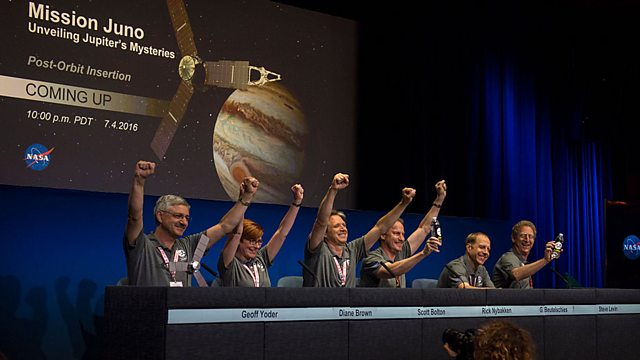
Juno Arrives
Juno arrives; Mosquitoes at the RS Summer Exhibition; Dolly the Sheep; Spoon-billed Ssandpipers; Robotic Ray; Plastics in Body; Cleaning Up the Oceans
There was great excitement this week, as Nasa’s Juno Probe arrives at Jupiter. The daring mission to get close to the giant planet has taken more than five years to reach the point of orbit. Juno is constructed like an armoured tank, to protect it from Jupiter’s intense radiation which could disrupt most spacecraft electronics. We hear from the ����ý’s Jonathan Amos who was there to watch it and Roland Pease talks to the Chief Mission Scientist, Fran Baganal.
Cutting-edge Medicine from the RS
The Royal Society Summer Exhibition is the place to see some of the latest technology transforming medicine. Insect repellent should, of course, deter mosquitoes - but on the other hand they need to be in contact with it for long enough to get the right dose of insecticide. Researchers from the Liverpool School of Tropical Medicine are using infrared cameras to track the movements of malaria-carrying mosquitoes as they bounce around mosquito nets – to make sure they are landing on them for just the right amount of time. The team has also developed a video game where you capture and test mosquitoes, to help train local teams in mosquito control.
Dolly the Sheep
To mark the 20th anniversary of the birth of Dolly the sheep at the Roslin Institute, University of Edinburgh, ����ý’s Sarah Montague talks to Dolly’s creator, Professor Sir Ian Wilmut.
Spoon-Billed Sandpiper Setback
Efforts to breed in captivity the endangered Spoon-billed Sandpiper suffered a double blow this week. Two chicks, hatched within a few hours of each other, died unexpectedly setting back the RSPB’s project to try to save the tiny birds from extinction.
Robotic Ray
The latest soft-bodied robot mimics marine life: a ray, built from a gold skeleton with a layer of heart cells. The cardiac cells, originating from a mouse, have their DNA engineered to be responsive to light. Specific wavelengths are able to trigger the heart cells to contract, leading to forward thrust and spin. The robot is able to be guided through a small obstacle course. It is the result of a multi-disciplinary project involving optogenetics, robotics, biomaterials and art. This robot aims to better understand the ability of cardiac cells to act on fluids like blood. Roland Pease talks to Kit Parker.
Plastics in Body
Elsewhere at the Royal Society Summer Science Exhibition, a stand looks at the latest generation of plastic body implants – including pins and screws that hold broken bones together as they heal, and then melt away when they have done their job. There are even some plastics being developed that can deliver drugs inside the body in a similar way. Claudia talks to Davide De Focatiis.
Cleaning Up the Oceans
More than five million tonnes of plastic waste ends up in the oceans every year. The abandoned fishing gear and bags and bottles left on beaches can smother birds and sea life. Now there is also evidence that the small particles created as the plastics are eroded by the waves and sunlight are eaten by all kinds of marine species. Roland Pease is on a beach in Devon in south-west England with Professor Richard Thompson of Plymouth University finding the plastic debris before it gets into the sea. Professor of Ecotoxicology at Exeter University, Tamara Galloway, talks about her discoveries of microplastics in plankton and other species. Dr Nancy Wallace of the US Marine Debris Program explains how they organise beach clean ups and raise awareness of the problem amongst the public.
(Photo caption: Members of the Juno team celebrate at a press conference after they received confirmation from the Juno spacecraft that it had completed the engine burn and successfully entered into orbit around Jupiter, July 4, 2016 in Pasadena, CA © NASA/Aubrey Gemignani)
The Science Hour was presented by Claudia Hammond with comments from ����ý News science reporter Victoria Gill
Producer: Alex Mansfield
Last on
More episodes
Next
Broadcasts
- Sat 9 Jul 2016 08:06GMT����ý World Service Australasia
- Sat 9 Jul 2016 22:06GMT����ý World Service except News Internet
- Sun 10 Jul 2016 01:06GMT����ý World Service Australasia
- Sun 10 Jul 2016 16:06GMT����ý World Service Online
- Mon 11 Jul 2016 05:06GMT����ý World Service South Asia
Podcast
-
![]()
Unexpected Elements
The news you know, the science you don't

